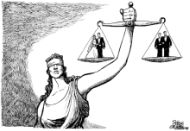 Sometime during my junior year in college (69-70), many of us guys sat nervously around the radio, waiting to hear what our draft number would be. I’m not sure how the Selective Service had determined the order of eligible young men to be called up for military service prior to that time, but at the end of the 60s, a lottery system was put into place, and the order a date of birth was pulled from the jar determined how high or how low a guy’s chances of being called up would be. Therefore, if you had a low lottery number (under a 100 at least), your chances of being drafted were very high. If your number was larger, say in the 300s, your chances of not being drafted would much better.
Sometime during my junior year in college (69-70), many of us guys sat nervously around the radio, waiting to hear what our draft number would be. I’m not sure how the Selective Service had determined the order of eligible young men to be called up for military service prior to that time, but at the end of the 60s, a lottery system was put into place, and the order a date of birth was pulled from the jar determined how high or how low a guy’s chances of being called up would be. Therefore, if you had a low lottery number (under a 100 at least), your chances of being drafted were very high. If your number was larger, say in the 300s, your chances of not being drafted would much better.
There were other factors involved also. Each county had its own draft board, which received a quota for the number of young men that it was required to send (probably based on the population of the county), and a guy’s lottery number within that smaller county pool might also determine whether he would be called up or not.
I don’t recall anyone in my group of friends or even others on the Fort Hays campus that were very “gung ho” about going, but if someone had a low number, he was surely resigned to his fate of either being drafted or enlisting. There were a few anti-war protests and counter-protests on campus; however, in reality, there were more students who chose to be onlookers, rather than participants for either side.
By this time, the Vietnam War had been going on with U.S. involvement for more than seven years. Everyone had seen a lot of the fighting and other images of the war on TV. (Here we are forty-some years later, and what we can see is that there was a lot more openness in what was shown of the war then, than is shown of what is happening in Iraq in this war. Every day the names of the soldiers who were killed and where they were from could be found in the newspaper. (These days unless it’s some local soldier who has been killed, the rest of the country has no idea whose life has been sacrificed. And everyone–both those for and those against the war– knew there was a sacrifice in fighting a war–something the Bush government has always seemed to want to hide from the American people.) Many of us had brothers who had already gone off to the military, and, very likely, to Vietnam. If not brothers, at least, we new of other relatives or local guys who had been called to service.
So, for a those of us guys there at Fort Hays and other schools across the country, getting our draft number in those days was part of college life, and, of course, the lower the number, the more heavily it probably weighed on one’s mind.
Even before the lottery, the draft system was something involved in our lives, because if you were in college, you had to get a deferment from your local draft board. When you turned 18, you had to sign up with the draft board, and if you weren’t in school, you were eligible to be called up. That meant college guys had to have a deferment, in order not to be drafted, but it also meant that you had to maintain passing grades and be taking a full college course load. The deferment was only temporary, though. When you graduated, you could be called up right away. Consequently, while you were still in school, what was going to happen to you afterwards, especially in respect to going into the military, was never far from your mind.
My number was 156. It was neither a good number nor a bad number. It wasn’t low enough so that the certainty of being taken was there. On the other hand, it wasn’t high enough that it was likely that I would not go. It was a middle number–a sort of “in limbo” number.
College life went on, though, that year or so, with the usual studies, parties, and vacations back home. Mixed into that life, some guys looked for alternative means, if not to avoid the draft altogether, but, perhaps to delay the inevitable. Some decided that getting married and starting a family–earlier than they might otherwise have come to that decision–was their way to hold off Uncle Sam (Think Dick Cheney). A few went into grad school in order to get an extended deferment (Think Dick Cheney again). There were others who chose to commit to the National Guard or the Reserves (Think GWB) because in those days very few guard or reserve units were called to go to Vietnam. However, in those days with so many wanting to go that route, these more local units had limit restrictions on the number of men they could take; consequently, in a lot of cases, a guy had to “know somebody” in order to get into the guards or reserves. (One thing that really irks me about the Iraq War: If the country really had been ready AND WILLING to go to war there, they should have re-instated the draft in order to have the manpower to complete that task successfully and fully maintain the military’s strength all around the world.)
At some point during my senior year, I got orders to go for my pre-induction physical. I had to go to Kansas City by bus, stay overnight, and was given my physical, lined up with hundreds of other guys, at the induction center which was in KC back then. The Selective Service made you take this physical early so that there would be no doubt about your health situation before they actually drafted you.
My final semester of college was my teaching block semester, so I spent part of it doing my student teaching at Great Bend High School. For the six weeks that I did my student teaching, I rented a basement apartment in a little old bungalow near the high school. Some people drove the approximately 50-mile drive each way from Hays every day, but I had opted not to do that. However, I drove my purple VW back to Hays to spend time catching up with my roommates every weekend, and even sometimes during the week when I had meetings or a big basketball game to watch on campus.
I had two cooperating teachers (the real teachers of the class), and for some reason, the one I worked with most, felt threatened by me. I don’t really know why. He was pretty well known among the teaching circles in that subject and had won different honors, and I was just this kid, having just turned 21, but looked even younger. Maybe that was the problem: that I wasn’t much older than most of my students. I learned a lot during that time, for the practical experience was real, and what we had studied in our “block” courses hadn’t really prepared us for the reality of the classroom. On my last day of student teaching, one class of my seniors gave me a going away present–a mini keg of beer–in class nonetheless. My cooperating teacher was just about beside himself–irate is probably more like it, but he didn’t do anything, maybe because it had happened on his watch. Or perhaps in those days, it wasn’t such a big deal. I can’t imagine anything like that happening these days, but, heck, these days they bring guns to school.
I was a bit worried about how that might affect my student teaching report because I still had to return to campus for a few weeks to finish up my courses and get my final student teaching evaluation. Despite my nervousness, the evaluations from my cooperating teachers were good, and there was no mention of the mini keg.
Filed under: Cars and More, Geography, The VW Bug Chronicles | Tagged: Army Reserves, cheney, college life, draft board, Draft Deferment, Draft Lottery, Fort Hays State, gay, George W Bush, GLBT, Great Bend, Hays Kansas, Iraq War, National Guard, pre-induction physical, Selective Service, Student Teaching, the 60s, the 70s, the Draft, Uncle Sam, Vietnam War, Volkswagen, VW beetle, VW Bug | Leave a comment »




 http://jointheimpact.com
http://jointheimpact.com

